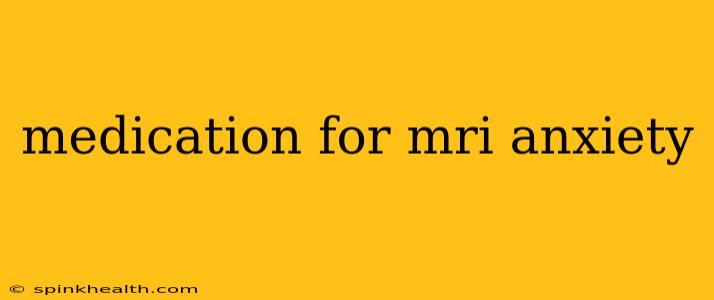Taming the MRI Machine: Finding Calm Amidst the Clang and Hum
The echoing clang, the confined space, the loud humming – for many, an MRI scan is a source of significant anxiety. The thought of being trapped in a narrow tube for an extended period can trigger claustrophobia, panic attacks, or a general feeling of unease. But what if I told you there are ways to navigate this experience with more comfort and less dread? This isn't just about managing anxiety; it's about reclaiming your health journey and facing medical procedures with confidence.
My own journey with MRI anxiety started unexpectedly. Preparing for a routine check-up, the looming MRI loomed larger than the actual medical concern. The images swirling in my mind – the darkness, the noise, the potential feeling of suffocation – were far more frightening than the procedure itself. I knew I couldn't let fear dictate my health decisions, so I began researching ways to alleviate my anxiety. This led me to discover a range of strategies and options, many of which I'll share with you today.
What Medications Can Help with MRI Anxiety?
This is often the first question people ask, and it's a valid one. Several medications can help manage anxiety related to MRI scans. However, it's crucial to discuss these options with your doctor. They can assess your specific needs and recommend the most appropriate medication and dosage for you. The type of medication will depend on the severity of your anxiety and any other medical conditions you may have.
Commonly considered medications might include:
- Anxiolytics (anti-anxiety medications): These medications work to reduce anxiety symptoms. Your doctor may prescribe a short-acting anxiolytic to take before your scan.
- Benzodiazepines: These are a class of anxiolytics that can provide rapid relief from anxiety. However, they can cause drowsiness and should be used cautiously, particularly if you need to drive afterward.
- Beta-blockers: These medications don't directly treat anxiety but can help manage physical symptoms like a racing heart or trembling, often associated with anxiety.
It's vital to remember: Never take medication prescribed for someone else. Always consult your doctor to determine the safest and most effective approach for managing your specific anxiety related to MRIs.
Are there Alternatives to Medication for MRI Anxiety?
Absolutely! Many individuals find success managing MRI anxiety without medication. These alternatives often complement medical treatments or can be used independently, depending on individual needs.
What are Some Non-Medication Strategies for Managing MRI Anxiety?
Several non-medication strategies can significantly reduce anxiety before and during an MRI:
- Cognitive Behavioral Therapy (CBT): CBT techniques can help you identify and challenge negative thoughts and develop coping strategies for managing anxiety.
- Relaxation techniques: Deep breathing exercises, progressive muscle relaxation, and mindfulness meditation can help calm your nervous system before and during the scan. Practicing these techniques regularly can significantly improve your ability to manage anxiety in stressful situations.
- Distraction techniques: Bringing music, podcasts, or audiobooks can help divert your attention away from the claustrophobic environment. Many MRI facilities allow for personal music players.
- Open MRI: If claustrophobia is your primary concern, ask your doctor if an open MRI machine is an option. Open MRIs are less enclosed and may be more comfortable for some individuals.
- Preparation and communication: Talking to your doctor and the MRI technicians about your anxiety can help reduce your apprehension. Knowing what to expect can significantly reduce fear. Ask about the duration of the scan and what to anticipate during the process.
How Can I Prepare Myself Mentally for an MRI?
Mental preparation is key. Start by acknowledging your anxiety and recognizing it as a normal response to a potentially stressful situation. Engage in relaxation techniques in the days leading up to the scan. Visualize a successful and comfortable experience. Positive self-talk can also make a difference. Remind yourself that you are capable of handling this and that many others have successfully undergone MRIs.
The journey toward conquering MRI anxiety is a personal one. Whether you opt for medication, alternative therapies, or a combination of both, remember that support is available. Open communication with your doctor is crucial in finding the best approach for your individual needs. With the right strategies and support, you can overcome your fears and face your MRI with confidence. Remember, you’re not alone, and a comfortable and successful MRI experience is within reach.

